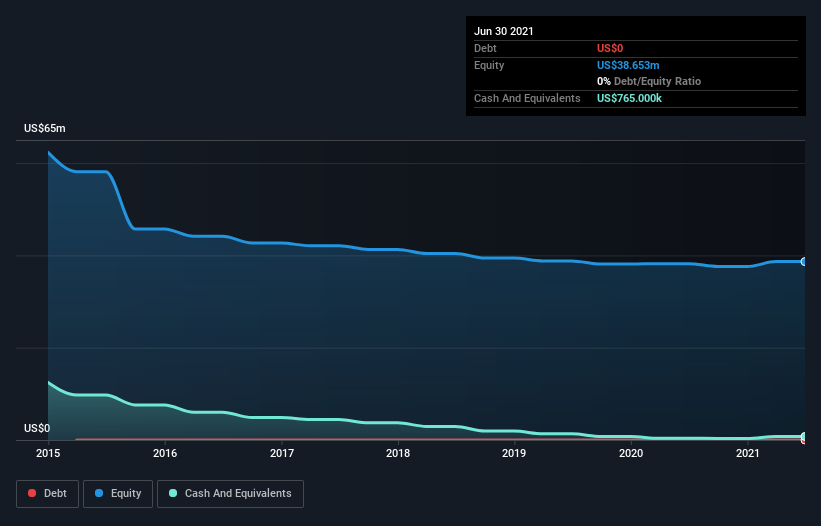We're Hopeful That Zanaga Iron Ore (LON:ZIOC) Will Use Its Cash Wisely
We can readily understand why investors are attracted to unprofitable companies. For example, biotech and mining exploration companies often lose money for years before finding success with a new treatment or mineral discovery. Nonetheless, only a fool would ignore the risk that a loss making company burns through its cash too quickly.
Given this risk, we thought we'd take a look at whether Zanaga Iron Ore (LON:ZIOC) shareholders should be worried about its cash burn. In this article, we define cash burn as its annual (negative) free cash flow, which is the amount of money a company spends each year to fund its growth. Let's start with an examination of the business' cash, relative to its cash burn.
See our latest analysis for Zanaga Iron Ore
When Might Zanaga Iron Ore Run Out Of Money?
A company's cash runway is the amount of time it would take to burn through its cash reserves at its current cash burn rate. When Zanaga Iron Ore last reported its balance sheet in June 2021, it had zero debt and cash worth US$765k. In the last year, its cash burn was US$447k. That means it had a cash runway of around 21 months as of June 2021. While that cash runway isn't too concerning, sensible holders would be peering into the distance, and considering what happens if the company runs out of cash. The image below shows how its cash balance has been changing over the last few years.
How Is Zanaga Iron Ore's Cash Burn Changing Over Time?
Zanaga Iron Ore didn't record any revenue over the last year, indicating that it's an early stage company still developing its business. So while we can't look to sales to understand growth, we can look at how the cash burn is changing to understand how expenditure is trending over time. Notably, its cash burn was actually down by 55% in the last year, which is a real positive in terms of resilience, but uninspiring when it comes to investment for growth. Zanaga Iron Ore makes us a little nervous due to its lack of substantial operating revenue. We prefer most of the stocks on this list of stocks that analysts expect to grow.
Can Zanaga Iron Ore Raise More Cash Easily?
There's no doubt Zanaga Iron Ore's rapidly reducing cash burn brings comfort, but even if it's only hypothetical, it's always worth asking how easily it could raise more money to fund further growth. Companies can raise capital through either debt or equity. Many companies end up issuing new shares to fund future growth. We can compare a company's cash burn to its market capitalisation to get a sense for how many new shares a company would have to issue to fund one year's operations.
Zanaga Iron Ore has a market capitalisation of US$21m and burnt through US$447k last year, which is 2.1% of the company's market value. So it could almost certainly just borrow a little to fund another year's growth, or else easily raise the cash by issuing a few shares.
So, Should We Worry About Zanaga Iron Ore's Cash Burn?
It may already be apparent to you that we're relatively comfortable with the way Zanaga Iron Ore is burning through its cash. For example, we think its cash burn relative to its market cap suggests that the company is on a good path. And even though its cash runway wasn't quite as impressive, it was still a positive. Based on the factors mentioned in this article, we think its cash burn situation warrants some attention from shareholders, but we don't think they should be worried. On another note, we conducted an in-depth investigation of the company, and identified 4 warning signs for Zanaga Iron Ore (1 is significant!) that you should be aware of before investing here.
Of course Zanaga Iron Ore may not be the best stock to buy. So you may wish to see this free collection of companies boasting high return on equity, or this list of stocks that insiders are buying.
This article by Simply Wall St is general in nature. We provide commentary based on historical data and analyst forecasts only using an unbiased methodology and our articles are not intended to be financial advice. It does not constitute a recommendation to buy or sell any stock, and does not take account of your objectives, or your financial situation. We aim to bring you long-term focused analysis driven by fundamental data. Note that our analysis may not factor in the latest price-sensitive company announcements or qualitative material. Simply Wall St has no position in any stocks mentioned.
Have feedback on this article? Concerned about the content? Get in touch with us directly. Alternatively, email editorial-team (at) simplywallst.com.

 Yahoo Movies
Yahoo Movies 
